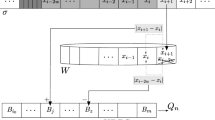Abstract
In this paper, we present a method for approximating the values of sensors in a wireless sensor network based on time series forecasting. More specifically, our approach relies on autoregressive models built at each sensor to predict local readings. Nodes transmit these local models to a sink node, which uses them to predict sensor values without directly communicating with sensors. When needed, nodes send information about outlier readings and model updates to the sink. We show that this approach can dramatically reduce the amount of communication required to monitor the readings of all sensors in a network, and demonstrate that our approach provides provably-correct, user-controllable error bounds on the predicted values of each sensor.
Preview
Unable to display preview. Download preview PDF.
Similar content being viewed by others
References
Adler, R., et al.: Design and deployment of industrial sensor networks: Experiences from the north sea and a semiconductor plant. In: SenSys (2005)
Brockwell, P., Davis, R.: Introduction to Time Series and Forecasting. Springer, Heidelberg (1994)
Brooke, T., Burrell, J.: From ethnography to design in a vineyard. In: Proceeedings of the DUX Conference (June 2003) Case Study
Cheng, R., Kalashnikov, D.V., Prabhakar, S.: Evaluating probabilistic queries over imprecise data. In: Proceedings of SIGMOD (2003)
Chu, D., Desphande, A., Hellerstein, J., Hong, W.: Approximate data collection in sensor networks using probabilistic models. In: ICDE (April 2006)
Cowell, R., Dawid, P., Lauritzen, S., Spiegelhalter, D.: Probabilistic Networks and Expert Systems. Springer, New York (1999)
Crossbow, I.: Wireless sensor networks (mica motes), http://www.xbow.com/Products/Wireless_Sensor_Networks.htm
Deshpande, A., Guestrin, C., Madden, S., Hellerstein, J., Hong, W.: Model-driven data acquisition in sensor networks. In: VLDB (2004)
Golub, G., Van Loan, C.: Matrix Computations. Johns Hopkins, Baltimore (1989)
Han, Q., Mehrotra, S., Venkatasubramanian, N.: Energy efficient data collection in distributed sensor environments. In: Proceedings of ICDCS (2004)
Intanagonwiwat, C., Govindan, R., Estrin, D.: Directed diffusion: A scalable and robust communication paradigm for sensor networks. In: MobiCOM (2000)
Jain, A., Chang, E.Y., Wanf, Y.: Adaptive stream management using kalman filters. In: SIGMOD (2004)
Kotidis, Y.: Snapshot queries: towards data-centric sensor networks. In: Proc. of the 21th Intl. Conf. on Data Engineering (April 2005)
Lazaridis, I., Mehrotra, S.: Capturing sensor-generated time series with quality guarantees. In: Proceedings of ICDE (2003)
Madden, S., Hong, W., Hellerstein, J.M., Franklin, M.: TinyDB web page, http://telegraph.cs.berkeley.edu/tinydb
Mainwaring, A., Polastre, J., Szewczyk, R., Culler, D.: Wireless sensor networks for habitat monitoring. In: WSNA (2002)
Mitchell, T.: Machine Learning. McGraw Hill, New York (1997)
Olston, C., Widom, J.: Best effort cache sychronization with source cooperation. In: Proceedings of SIGMOD (2002)
Polastre, J., Hill, J., Culler, D.: Versatile low power media access for wireless sensor networks. In: Proceedings of SenSys (2004)
Pottie, G., Kaiser, W.: Wireless integrated network sensors. Communications of the ACM 43(5), 51–58 (2000)
Tulone, D.: A resource–efficient time estimation for wireless sensor networks. In: Proc. of the 4th Workshop of Principles of Mobile Computing, pp. 52–59 (2004)
Welsh, M., Mainland, G.: Programming sensor networks using abstract regions. In: NSDI (March 2004)
Author information
Authors and Affiliations
Editor information
Editors and Affiliations
Rights and permissions
Copyright information
© 2006 Springer-Verlag Berlin Heidelberg
About this paper
Cite this paper
Tulone, D., Madden, S. (2006). PAQ: Time Series Forecasting for Approximate Query Answering in Sensor Networks. In: Römer, K., Karl, H., Mattern, F. (eds) Wireless Sensor Networks. EWSN 2006. Lecture Notes in Computer Science, vol 3868. Springer, Berlin, Heidelberg. https://doi.org/10.1007/11669463_5
Download citation
DOI: https://doi.org/10.1007/11669463_5
Publisher Name: Springer, Berlin, Heidelberg
Print ISBN: 978-3-540-32158-3
Online ISBN: 978-3-540-32159-0
eBook Packages: Computer ScienceComputer Science (R0)




